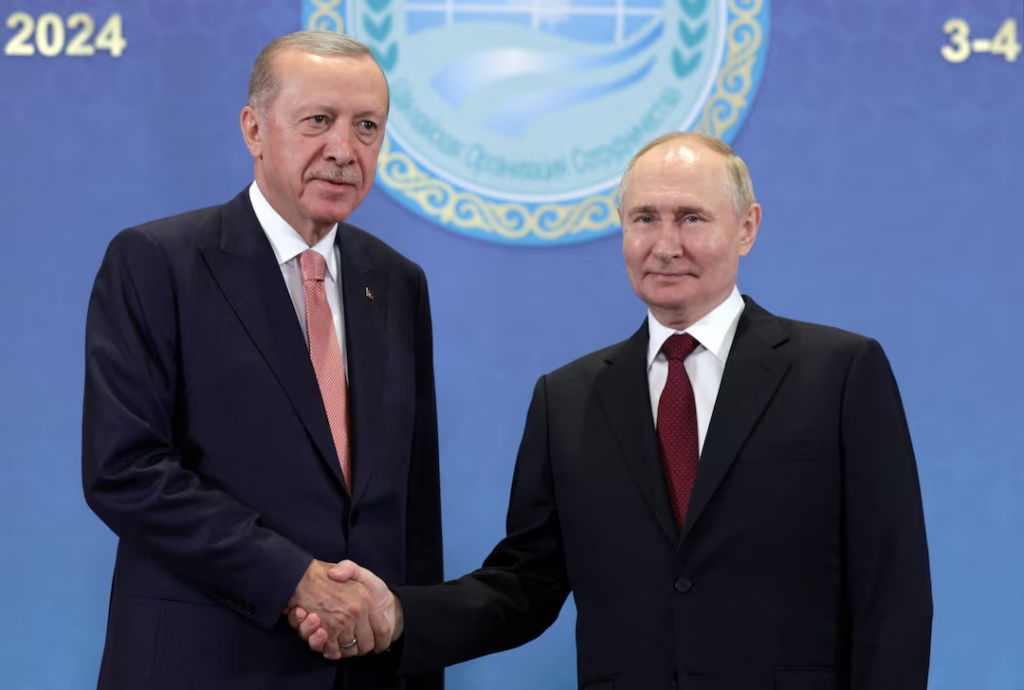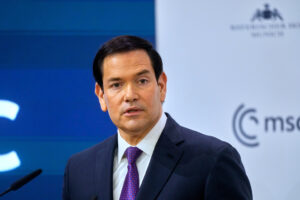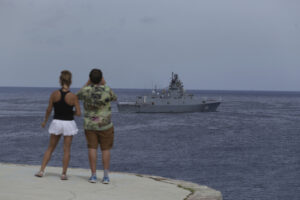Rethinking Alliances: Europe’s Path to Security Without Türkiye
In a future deepening conflict between NATO and Russia, could Europe rely on Türkiye’s total cooperation as a NATO ally, considering Erdoğan’s stable relationship with Putin? An EU security and defense regime separate from NATO would allow EU member states to focus solely on security threats that directly affect them without the need to worry about how Türkiye may react.

Russian President Vladimir Putin shakes hands with Turkish President Tayyip Erdogan during a meeting on the sidelines of the Shanghai Cooperation Organization (SCO) summit. July 3, 2024. Sputnik/Gavriil Grigorov/Pool via REUTERS
Signed in 1992, the Maastricht Treaty officially created the European Union (EU), setting Europe on a path to closer integration. Considered a “major milestone” in global geopolitics, the Maastricht Treaty was instrumental in the creation of the eurozone, and established common goals for both foreign and security policy and justice and home affairs across European member states. In the more than three decades since the signing of this treaty, EU member states have come together in many aspects, but one seemingly significant pillar is still missing: a common defense and security regime. The gap exists largely thanks to the fact that many EU member states are also members of the North Atlantic Treaty Organization (NATO). With the threat of Russia more imminent than ever before in the twenty-first century, the EU must introduce measures to protect itself without outside influence and reliance on unstable allies.
A common defense and security regime within the EU would allow EU member states to more deeply address the security threats most pertinent to them, reducing reliance on the agreement of President Erdoğan and Türkiye, whose commitment to NATO may be wavering. Türkiye (officially renamed from “Turkey” by the UN and US State Department) has demonstrated interests that diverge from, or even contradict, the security priorities of the EU, working “relentlessly to undermine NATO security.” Türkiye’s membership in NATO has been questioned since it joined in the 1950s, more so than “any other member state.” As of March 2022, immediately after Russia’s invasion of Ukraine, a majority of the Turkish population perceived the United States as Türkiye’s greatest threat, while less than 20 percent viewed Russia “in the same light.”
The threat of Russian aggression in the former Soviet republics never fully subsided post-independence in the early 1990s. It escalated in 2014 with the annexation of Crimea, and peaked in February 2022 with Russia’s full-scale invasion of Ukraine. Due to geographic proximity and a strained, turbulent history with Russia, EU members located east of the former Iron Curtain certainly view Russia as more of a security threat than Türkiye. Türkiye, under the Erdoğan administration, has become increasingly detached from the security issues affecting the EU, particularly due to its growing friendliness toward Russia. “To the extent the West is reliable, Russia is equally reliable,” Erdoğan commented during the U.N. General Assembly in September 2023, adding, “I trust Russia just as much as I trust the West.” This is an alarming statement coming from a member of NATO, whose main adversary is currently Russia. Statements like this suggest that a European Security and Defense Policy that excludes Türkiye—as it is not an EU member state—would prove beneficial in that all members would likely agree on a policy toward Russia, at least more so than Türkiye would. EU citizens have expressed overwhelming support for a European Security and Defense Policy. According to a 2006 article, 71 percent favored the creation of a European Security and Defense Policy, a figure that grew to 77 percent by 2024, notably after Russia’s full-scale invasion.
An EU security regime, even without Türkiye, would still need to account for the rise of right-wing and more Russia-friendly political parties in the EU, such as the AfD in Germany and the Freedom Party in Austria. However, not even all right-leaning parties and politicians have an affinity for Russia; Giorgia Meloni of Italy is an example, as she remains “broadly supportive of sanctions against Russia and aid to Ukraine.” We cannot say the same about Erdoğan, who “refused to join the Western economic and financial sanctions on Russia” following the 2022 invasion.
Türkiye initially disapproved of Sweden’s bid to join NATO in 2022, causing a rift between Ankara and Stockholm. Türkiye accused Sweden of “harboring Kurdish terrorists,” demanding that Sweden “tighten its anti-terrorism laws” and “extradite people accused of terrorist activities” in Türkiye. The Kurds, the “largest ethnic and linguistic minority in Türkiye,” are among the “most discriminated against” communities in Türkiye. Erdoğan used Sweden’s application for admission into NATO, “one of the few venues where Ankara can exert pressure on Western peers,” to further his agenda at home.
Sweden’s submission of a NATO application was a shocking turn of events, as Sweden (along with its Nordic neighbor Finland, who also applied to join NATO in 2022) had “long maintained military neutrality.” Sweden’s desire to join NATO resulted from Russia’s full-scale invasion of Ukraine, which “shattered a long-standing sense of stability in northern Europe” and left Sweden “feeling vulnerable,” demonstrating yet again that Russia poses a significant threat to countries across Europe, enough for states to seek new security guarantees (in Sweden’s case, NATO membership). A European security regime would automatically include Sweden as an EU member state, meaning no obstacles posed by Türkiye (which does not perceive the threat of Russia similarly to Sweden) would exist. The security of EU member states would not depend on the agreement of an unreliable and potentially problematic ally like Türkiye.
Türkiye’s allies-by-default—other NATO members—have found themselves questioning the country’s loyalty, as its relationship with Russia “survived the shock of the invasion of Ukraine,” in contrast with many of its allies who have demonized Russia’s actions. Despite the relationship between Europe and Russia deteriorating as a result of the war, the relationship between Türkiye and Russia has remained relatively intact, suggesting that Türkiye is less opposed to Russia’s actions than it should be as a NATO member. This is alarming, given that Russia’s invasion of Ukraine may lead to a wider military conflict with NATO members in the future.
Even before Putin’s full-scale invasion of Ukraine in 2022, Russia’s relationship with the West was arguably at its worst since the days of the Cold War. These relations have only dramatically worsened since 2022, yet Turkish-Russo relations remained relatively stable. The goal of an alliance is to work as a team, yet Erdoğan’s Türkiye has demonstrated a “devot[ion]to undermining the trans-Atlantic alliance.” How would this play out in the face of a widening conflict with Russia? Can Europe count on Türkiye to behave like a reliable ally against Russia if necessary? The establishment of a European security regime would render this question much less important, as the new regime would exclude Türkiye on the basis of its lack of EU membership. If the US under Trump actually left NATO (unlikely, but not impossible), then Türkiye’s threat to EU security due to its relationship with Russia would become even more pronounced.
NATO has already undertaken preliminary planning for a Russian invasion of NATO soil. Since tensions escalated in Ukraine in 2014, NATO has deployed “multinational battlegroups” to the Baltics, though critics argue these may not be “sufficient to defeat a Russian invasion.” If Russia were to invade the Baltics, presumably after a Ukrainian defeat, NATO would face a significant dilemma: risk further escalation and a “prolonged ground war” to “liberate” the Baltics, or “accept the new status quo”––essentially letting the Baltics fall to Russia. If such dire circumstances arose, leading to decisions whose consequences could result in the redrawing of the map of Europe, all NATO allies would need to securely align on a course of action. Would Türkiye go to war with Russia over the Baltics? A European security regime would not need to ponder this question, and would engage in military conflict with Russia in order to secure the safety and sovereignty of the Baltic states, and any other EU states threatened by Russian aggression.
Estonia has already planned to contribute at least 0.25 percent of its GDP to Ukrainian defense, with former Prime Minister Kaja Kallas, who served until this summer, urging all NATO members to follow suit. “That’s what Ukraine needs to win this war,” Kallas said, adding that aiding Ukraine is “necessary for our [Estonia’s] security.” With the security of large portions of Europe dependent on an irrational actor like Putin, Europe needs strong, unrelenting support from secure allies now more than ever. Over time, Türkiye’s actions have demonstrated itself to be worthy of the EU questioning its alliance.
In today’s turbulent atmosphere, agreement and alliance to the highest degree is of the utmost importance. It is in the EU’s best interest to establish a common defense regime to best protect its members from a formidable threat without concerning itself with Erdoğan and the unsettling Turkish relationship with Russia.
Editors
Julia White, Managing Editor
Jacqueline Tong, Copy Editor

Nicole Monette (she/her) is a second-year master’s student in the Global Journalism and European & Mediterranean Studies program. She graduated in May 2022 with a Master of Science in Global Affairs from NYU, where she completed her thesis on plausible scenarios for the trajectory of the war in Ukraine. As a Global Affairs student, she was a member of a consulting project in conjunction with the UN Security Council Counter-Terrorism Committee researching the political climate in Afghanistan following the U.S. withdrawal in 2021. She was also the Managing Editor of Global Affairs Review, the student journal of NYU’s Center for Global Affairs. Before returning to NYU, she spent eight months in Rome and Milan studying Italian at an intensive language school. She is currently researching issues related to youth unemployment and depopulation in southern Italy, specifically the regions of Calabria and Sicily.




